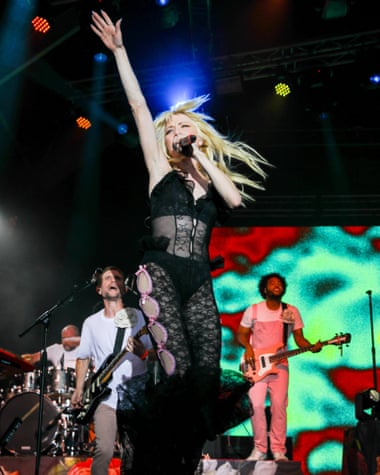The received wisdom around Carly Rae Jepsen is that the Canadian pop star is a bit of a flop. After her 2012 single Call Me Maybe became the bestselling single of the 21st century by a female artist, her next album, 2015’s Emotion, failed to reach anywhere near those commercial heights. Nevertheless, its rapturous, sax-garnished sound inspired a cult following, particularly among LGBTQ+ pop fans. And when her more successful peers are at pains to tell us how miserable fame is, and tonight Jepsen greets 3,500 Londoners who scream back every word in between hits of poppers and basically receive her as if she were Madonna, it’s hard not to see her left-of-centre pop status as anything but a very plum gig. At any rate, it gives her a palpable sense of freedom that she shares abundantly.
On this stifling night at Somerset House, Jepsen’s luxuriant disco-pop goes down a treat, but she also brings a wild side that cuts through the treacly stupor. With her blond shaggy hair and tiny physique clad in black lace, she is at once guileless – always grinning, with the very slight choreography to the dreamy Julien (from her 2019 album Dedicated) seeing her act out the lyrics about running away and feeling torn up – and endearingly rabid. She punches the air during the shiny-bright title track to Emotion, palpably hungers as she declares “I wanna do bad things to you!” over the zippy funk of Want You in My Room and more often than not ends her songs on a massive high. Despite having a new album on the horizon, she doesn’t tease any unheard material – only the zen single Western Wind – presumably intent on keeping the mood elevated.
Jepsen’s defining lyrical trait is less about desire for any specific person than it is craving sensation itself: “Take me! To the! Feeling!” as she sings on Run Away With Me, which has everyone singing along to its rangy sax solo; slower songs, such as Too Much, tastefully sprinkled with tropical house, bask convincingly in sultriness. As she plays to the faithful, her desire for and creation of intensity generates a sort of reciprocal euphoria that you just don’t get at, say, a Dua Lipa gig, which imbues the night with a sense of pure good feeling.
You suspect it’s Jepsen’s combination of ardent sincerity – she’s not above playing Call Me Maybe, running back and forth down the front row to those pizzicato strings – and evident knowing that have made her a gay icon. “Who has any boy problems?” she says, introducing the sing-songy, self-deprecating track of the same name. She’s read the room: a wild singalong and a sea of arm-waving ensues. It’s that and laying claim to one of contemporary pop’s most killer catalogues: more fool those who turned off after Call Me Maybe.

